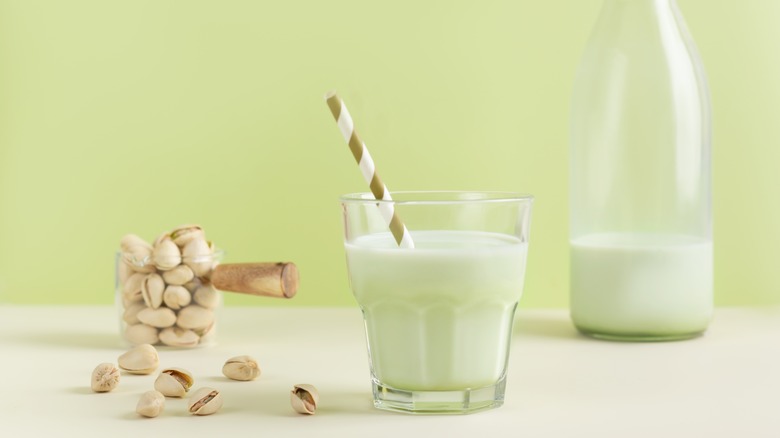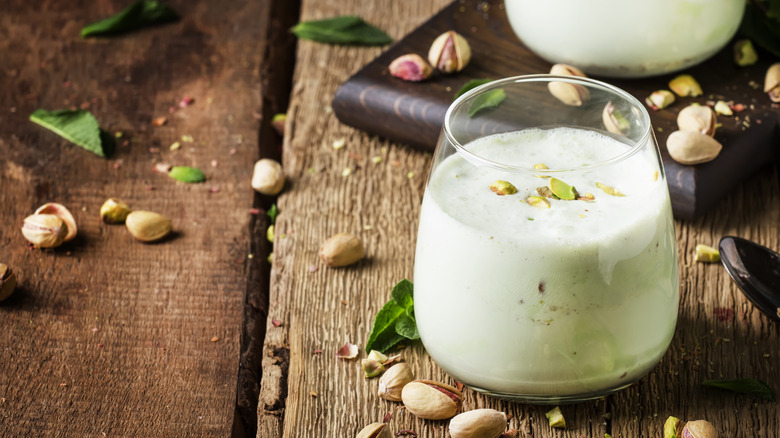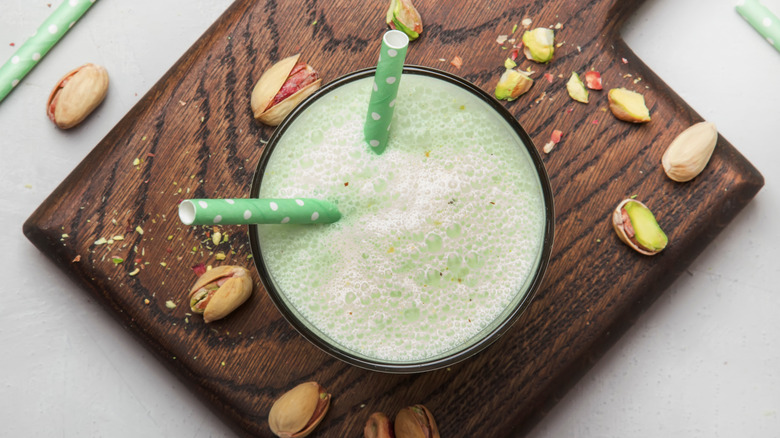What Is Pistachio Milk, And What Are Its Benefits?
Looking for an alternative to coconut or almond milk? Or maybe you want to give your morning coffee a makeover? Either way, consider switching to pistachio milk. This creamy beverage might just surprise your taste buds, adding a flavorful twist to everyday drinks, cereals, smoothies, and homemade desserts. It also packs a lot of nutrition and actually tastes like pistachios.
One cup of pistachio milk has less than 100 calories, but you'll get more than 2 grams of protein and high doses of calcium, iron, and vitamin A. By comparison, almond milk boasts 40 calories and 1 gram of protein per cup, whereas a cup of coconut milk offers 445 calories and more than 4 grams of protein. Any of these beverages can be a healthy choice, but pistachio milk has a rich, unique nutty flavor and velvety smoothness. Plus, it can be a worthy addition to homemade ice cream, protein shakes, coffee, or chia pudding.
Pistachio milk is a great alternative to cow's milk and other plant-based milks
Like other plant-based milks, pistachio milk is gluten-, dairy-, and lactose-free. What sets it apart is its delightful, lingering sweetness and nutty aroma. The milk is made by blending pistachio nuts and water, and then straining the mixture. You can use either raw or roasted nuts, soaking them in water beforehand to soften their texture. Pour the milk into the jar of your choosing for storage. You can add ingredients like honey, date syrup, maple syrup, cinnamon, or vanilla for extra flavor.
The beverage should have a pale green color and a buttery texture, but its sweetness depends on the ingredients used. Note that store-bought plant-based milks may contain added sugar, canola oil, or artificial flavors, so it's recommended to prepare it at home.
Unsweetened pistachio milk can replace almond, walnut, hazelnut, and cashew milk in most recipes. You can also use it as a substitute for cow's milk, depending on what you're cooking. Enjoy it as is or add it to oatmeal, porridge, custards, pancakes, waffles, or cream soups. For example, a traditional frosty iced coffee frappe is normally made with cow's milk, but you can use pistachio milk instead to great effect. Another option is to mix pistachio milk into sauces and salad dressings, or blend it into vegan cheese and spreads.
Switch to pistachio milk for an antioxidant boost
Pistachio milk isn't as nutritious as whole nuts, but it still delivers ample doses of calcium, iron, potassium, and other minerals. One cup boasts 30% of the recommended daily intake of vitamin A, 20% of the recommended daily allowance of calcium, and 2% of the recommended daily amount of iron. Moreover, pistachios are rich in beta-carotene, lutein, zeaxanthin, and other antioxidants, according to 2022 research published in the journal "Nutrients." These compounds fight oxidative stress, a risk factor for inflammation, cancer, and heart disease.
A 2023 study in the journal "Foods" suggests that fermented pistachio milk may protect against colon cancer. As the scientists note, this beverage has antioxidant and anti-inflammatory effects and may induce cancer cell death. However, the research is still in its early stages, so further studies are needed. It's also worth mentioning that lutein and zeaxanthin, two of the most abundant nutrients in pistachio milk, support eye health and may help prevent cataracts.
Last but not least, the beverage is good for the environment. After walnuts, pistachios have the second lowest carbon footprint of all nuts. By comparison, almond production requires more water, resulting in a higher carbon footprint. "Pistachios require a little less water for irrigation than almonds, but the big factor is that when the water runs out, and you can't give them any, pistachios have higher survival rates," said Richard Matoian, president of the American Pistachio Growers, in an interview with Comstock's Magazine.


